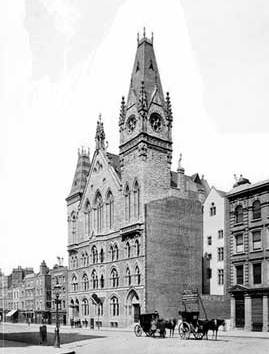|
John Tarring
John Tarring FRIBA (1806–1875) was an English Victorian ecclesiastical architect active in the mid-nineteenth century. Based in London, he designed many Gothic Revival churches for Nonconformist clients. Life Tarring was born at Holbeton, near Plymouth, and worked there as a carpenter or plasterer until moving to London in 1828. He studied at Brown's academy in Wells Street, and obtained a Royal Academy medal for a measured drawing. He became a member of the Royal Institute of British Architects in 1845. Tarring worked principally in London. His firm was variously known as "John Tarring, Esq.," "Tarring & Jones," and "J. Tarring & Son." His son Frederick William Tarring (1847–1925) succeeded him in the business. Known as the " Gilbert Scott of the Dissenters", he was the first architect to design a spire for a nonconformist church in London, and is thought to have influenced the Baptists and Congregationalists to begin building churches in the Gothic style. Most of his comm ... [...More Info...] [...Related Items...] OR: [Wikipedia] [Google] [Baidu] |
Congregational Memorial Hall
The Congregational Memorial Hall in Farringdon Street, London was built to commemorate the 200th anniversary of Great Ejection of Black Bartholomew's Day, resulting from the 1662 Act of Uniformity which restored the Anglican church. The two thousand puritan ministers who refused to take the oath of conformity thereby established non-conformism. The architect of the hall was John Tarring. The hall was built upon the site of the Fleet Prison in Farringdon Street. It opened in 1875 and served as a meeting place and home for the Congregational Library. Other progressive organisations met there including the Labour Party which was founded at a meeting there on 27 February 1900 initially under the name of the Labour Representation Committee. The hall was demolished in 1968 and Caroone House was built on the site — an office which was used by British Telecom for its international business and telephone tapping. In 1978 the Congregational Memorial Hall Trust was established ... [...More Info...] [...Related Items...] OR: [Wikipedia] [Google] [Baidu] |
Hampstead
Hampstead () is an area in London, which lies northwest of Charing Cross, and extends from Watling Street, the A5 road (Roman Watling Street) to Hampstead Heath, a large, hilly expanse of parkland. The area forms the northwest part of the London Borough of Camden, a borough in Inner London which for the purposes of the London Plan is designated as part of Central London. Hampstead is known for its intellectual, liberal, artistic, musical, and literary associations. It has some of the most expensive housing in the London area. Hampstead has more millionaires within its boundaries than any other area of the United Kingdom.Wade, David"Whatever happened to Hampstead Man?" ''The Daily Telegraph'', 8 May 2004 (retrieved 3 March 2016). History Toponymy The name comes from the Old English, Anglo-Saxon words ''ham'' and ''stede'', which means, and is a cognate of, the Modern English "homestead". To 1900 Early records of Hampstead can be found in a grant by King Ethelred the Unread ... [...More Info...] [...Related Items...] OR: [Wikipedia] [Google] [Baidu] |
People From South Hams (district)
A person ( : people) is a being that has certain capacities or attributes such as reason, morality, consciousness or self-consciousness, and being a part of a culturally established form of social relations such as kinship, ownership of property, or legal responsibility. The defining features of personhood and, consequently, what makes a person count as a person, differ widely among cultures and contexts. In addition to the question of personhood, of what makes a being count as a person to begin with, there are further questions about personal identity and self: both about what makes any particular person that particular person instead of another, and about what makes a person at one time the same person as they were or will be at another time despite any intervening changes. The plural form "people" is often used to refer to an entire nation or ethnic group (as in "a people"), and this was the original meaning of the word; it subsequently acquired its use as a plural form of ... [...More Info...] [...Related Items...] OR: [Wikipedia] [Google] [Baidu] |
Fellows Of The Royal Institute Of British Architects
{{disambiguation ...
Fellows may refer to Fellow, in plural form. Fellows or Fellowes may also refer to: Places * Fellows, California, USA * Fellows, Wisconsin, ghost town, USA Other uses * Fellows Auctioneers, established in 1876. *Fellowes, Inc., manufacturer of workspace products *Fellows, a partner in the firm of English canal carriers, Fellows Morton & Clayton * Fellows (surname) See also *North Fellows Historic District, listed on the National Register of Historic Places in Wapello County, Iowa *Justice Fellows (other) Justice Fellows may refer to: * Grant Fellows (1865–1929), associate justice of the Michigan Supreme Court * Raymond Fellows (1885–1957), associate justice of the Maine Supreme Judicial Court {{disambiguation, tndis ... [...More Info...] [...Related Items...] OR: [Wikipedia] [Google] [Baidu] |



_1938.jpg)